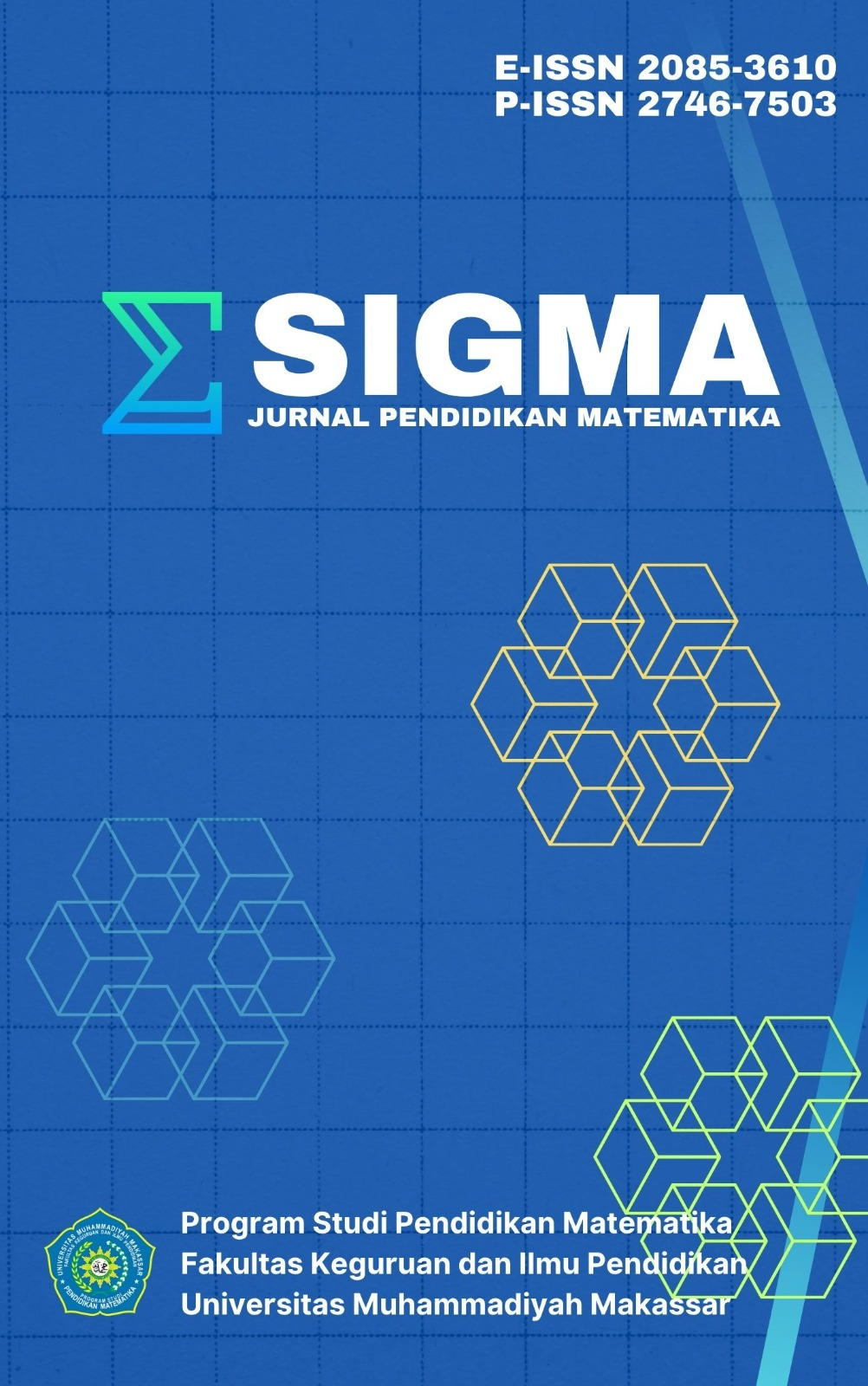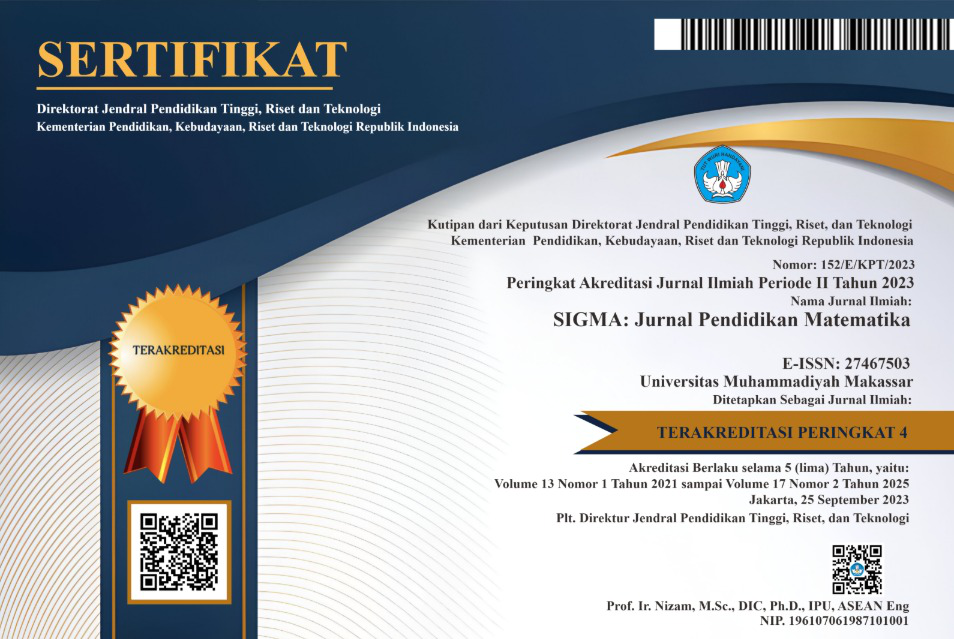DESAIN PEMBELAJARAN MATERI PELUANG DENGAN MODEL PEMBELAJARAN PROBLEM BASED-LEARNING TERHADAP KEMAMPUAN PEMECAHAN MASALAH SISWA
DOI:
https://doi.org/10.26618/sigma.v17i1.18043Keywords:
Problem-Based Learning, Materi Peluang, Pemecahan Masalah, Modul Ajar, Pembelajaran MatematikaAbstract
Penelitian ini bertujuan untuk mengembangkan dan menguji kelayakan, kepraktisan, serta efektivitas modul ajar matematika berbasis Problem-Based Learning (PBL) pada materi peluang guna meningkatkan kemampuan pemecahan masalah siswa SMK. Menggunakan pendekatan model pengembangan 4D (Define, Design, Develop, Disseminate), penelitian ini dimulai dengan analisis kebutuhan melalui wawancara dengan guru untuk mengidentifikasi kesulitan dalam pembelajaran peluang. Tahap desain menghasilkan modul ajar yang mengintegrasikan pendekatan saintifik dan strategi pembelajaran berdiferensiasi. Produk kemudian diuji melalui uji kelayakan (oleh pakar), uji kepraktisan (respon siswa dan observasi guru), dan uji efektivitas (melalui uji statistik). Hasil penelitian menunjukkan bahwa modul ajar memenuhi kriteria layak, praktis, dan efektif dengan nilai signifikansi uji chi-square dan uji-t sebesar 0.000 (< 0.05). Modul ajar juga disebarluaskan melalui platform daring agar dapat diakses oleh pendidik lainnya. Dengan demikian, modul ini dapat menjadi solusi inovatif dalam meningkatkan kualitas pembelajaran matematika berbasis kontekstual dan partisipatif.References
Ainley, J., et al. (2021). "Student Engagement in Mathematics: A Focus on Problem-Based Learning." Journal of Educational Psychology, 113(2), 345-360. https//doi..org/10.1037/edu0000456
Barrows, H. S. (2020). Problem-Based Learning: An Approach to Medical Education. Springer. https//doi..org/10.1007/978-3-030-33600-4
Batanero, C., et al. (2020). "Teaching Probability in School: Challenges and Opportunities." International Journal of STEM Education, 7(1), 1-15. https//doi..org/10.1186/s40594-020-00219-2
Chernoff, E. J., & Zazkis, R. (2020). "Probability in Mathematics Education: A Review of Recent Research." Educational Studies in Mathematics, 103(2), 123-145. https//doi..org/10.1007/s10649-020-09973-2
Chen, L., et al. (2020). "The Impact of Problem-Based Learning on Student Engagement in Mathematics." Journal of Educational Research, 113(4), 567-580. https//doi..org/10.1080/00220671.2020.1755643
Doorman, M., et al. (2020). "Contextual Problems in Mathematics Education: A Problem-Based Learning Approach." Educational Studies in Mathematics, 104(3), 345-360. https//doi..org/10.1007/s10649-020-09973-2
Hasan, H., & Nindiasari, H. (2023). Efektivitas Problem Based Learning (PBL) untuk Meningkatkan Kemampuan Berpikir Kritis Siswa di SMK Negeri 2 Pandeglang. NOTASI: Jurnal Pendidikan Matematika, 1(2). https://doi.org/10.70115/notasi.v1i2.99
Hmelo-Silver, C. E. (2019). "Problem-Based Learning: What and How Do Students Learn?" Educational Psychology Review, 16(3), 235-266. https//doi..org/10.1023/A:1026131715856
Jones, G. A., et al. (2021). "Probability in the Real World: Applications and Implications for Education." Journal of Mathematics Education, 12(1), 45-60. https//doi..org/10.1007/s10857-020-09480-2
Malinda, V., & Setiawan, W. (2022). Implementasi Problem Based Learning terhadap Hasil Belajar Matematik Siswa SMK Kelas XI. JPMI (Jurnal Pembelajaran Matematika Inovatif), 5(3). https://doi.org/10.22460/jpmi.v5i3.10191
Polya, G. (2019). How to Solve It: A New Aspect of Mathematical Method. Princeton University Press. https//doi..org/10.2307/j.ctvc773pk
Pratt, D., et al. (2021). "Challenges in Teaching Probability: A Review of Recent Studies." Statistics Education Research Journal, 20(1), 89-101. https//doi..org/10.52041/serj.v20i1.123
Savery, J. R. (2019). "Problem-Based Learning: An Instructional Model and Its Constructivist Framework." Educational Technology, 45(4), 31-38. https//doi..org/10.1111/j.1467-8535.2005.00527.x
Schoenfeld, A. H. (2020). Mathematical Problem Solving. Academic Press. https//doi..org/10.1016/C2017-0-02251-6
Shaughnessy, J. M. (2019). "Research on Probability in Mathematics Education: A Review of Recent Trends." Journal for Research in Mathematics Education, 50(2), 123-145. https//doi..org/10.5951/jresematheduc.50.2.0123
Silalahi, A. Y., Afrilianto, M., & Nurjaman, A. (2023). Penerapan Metode Problem Based Learning dalam Meningkatkan Hasil Belajar Matematika Siswa Kelas XI SMK. JPMI (Jurnal Pembelajaran Matematika Inovatif), 6(2). https://doi.org/10.22460/jpmi.v6i2.14021
Siswono, T. Y. E., et al. (2021). "Problem-Solving Ability in Mathematics: A Review of Recent Research." Journal of Mathematics Education, 14(3), 89-101. https//doi..org/10.22342/jme.14.3.12345
Tan, O. S. (2021). Problem-Based Learning Innovation: Using Problems to Power Learning in the 21st Century. Cengage Learning. https//doi..org/10.1007/978-981-10-2451-1
Wijnia, L., et al. (2021). "The Effectiveness of Problem-Based Learning in Mathematics Education: A Meta-Analysis." Educational Research Review, 32, 100-115. https//doi..org/10.1016/j.edurev.2020.100356
Witraguna, K.Y., Suryawan, I.P.P., (2024). Persepsi Guru Terhadap Pembelajaran dan Kemampuan Pemecahan Masalah Matematika Siswa Sekolah Menengah Atas. Jurnal Cendekia: Jurnal Pendidikan Matematika. 8(3). 2029. https://doi.org/10.31004/cendekia.v8i3.
Downloads
Additional Files
Published
Issue
Section
License
Copyright (c) 2025 SIGMA: JURNAL PENDIDIKAN MATEMATIKA

This work is licensed under a Creative Commons Attribution-ShareAlike 4.0 International License.
With the receipt of the article by the SIGMA: Jurnal Pendidikan Matematika Editorial Board and the decision to be published, then the copyright regarding the article will be diverted to SIGMA: Jurnal Pendidikan Matematika.
Universitas Muhammadiyah Makassar as the publisher of SIGMA: Jurnal Pendidikan Matematika hold the copyright regarding all the published articles in this journal.Universitas Muhammadiyah Makassar has the right to multiply and distribute the article and every author is not allowed to publish the same article that was published in this journal.
The manuscript authentic and copyright statement submission can be downloaded ON THIS FORM.






